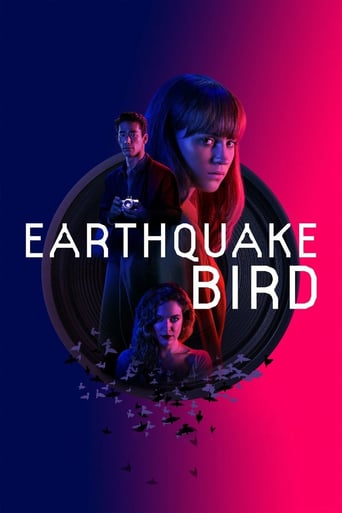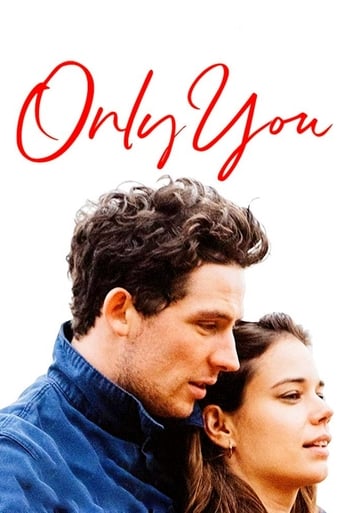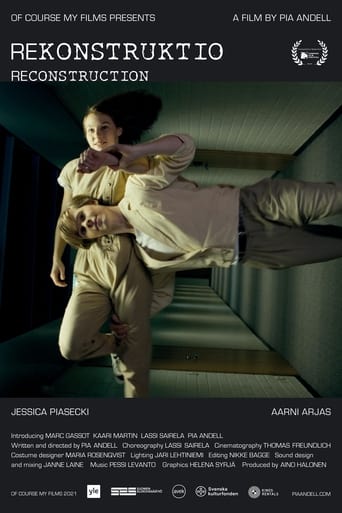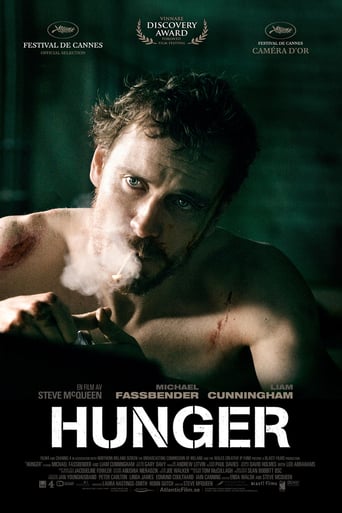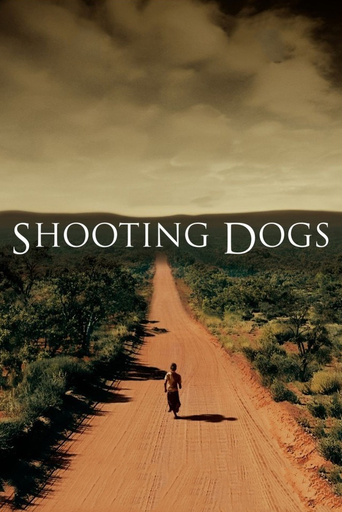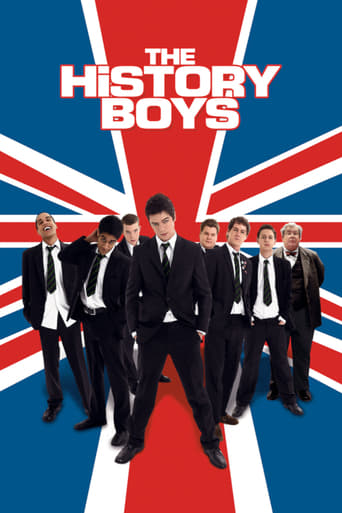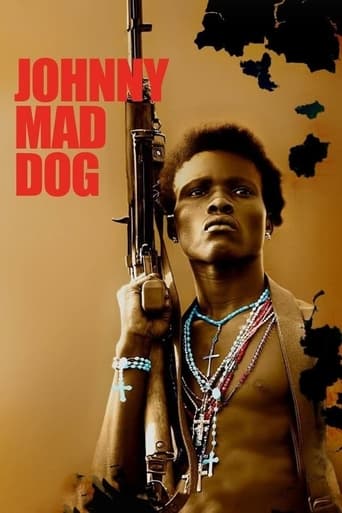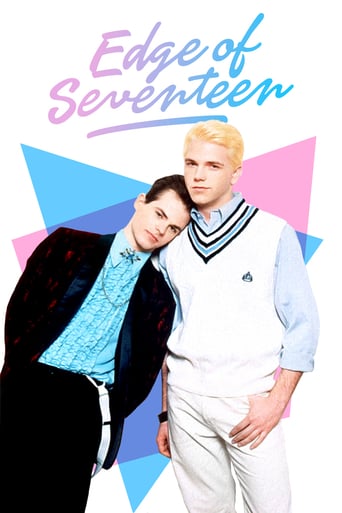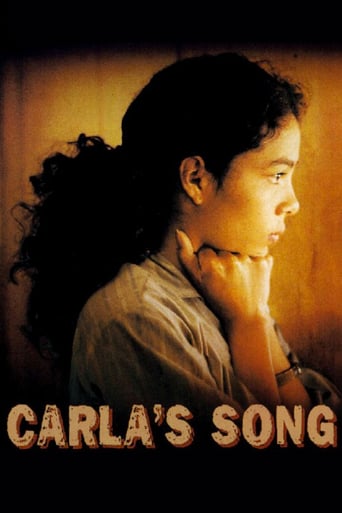
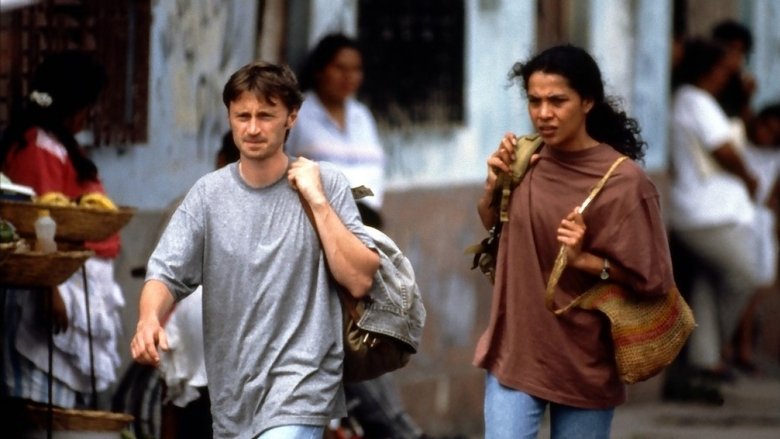
Carla's Song (1996)
A Glasgow man visits war-torn Nicaragua with a refugee tormented by her memories.
Watch Trailer
Cast
Similar titles
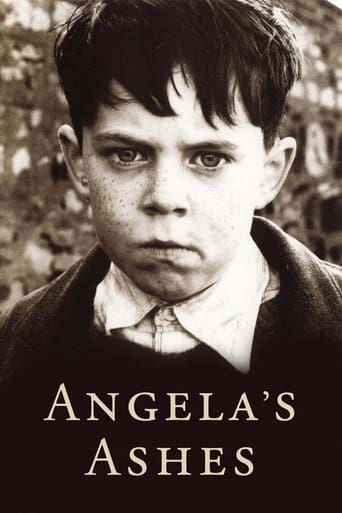
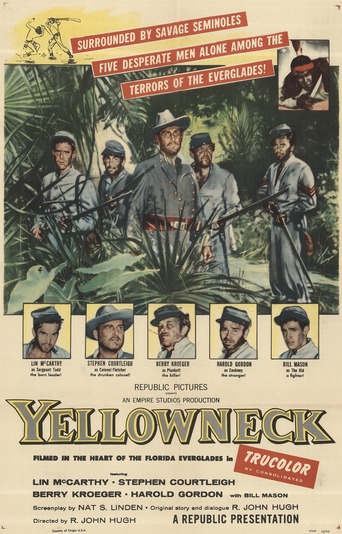
Reviews
To all those who have watched it: I hope you enjoyed it as much as I do.
The film creates a perfect balance between action and depth of basic needs, in the midst of an infertile atmosphere.
The joyful confection is coated in a sparkly gloss, bright enough to gleam from the darkest, most cynical corners.
Worth seeing just to witness how winsome it is.
I think I'd seen a trailer for the film a long time ago, I remembered it mainly because of the leading actor, I was certainly interested to see what I would make of it, directed by Ken Loach (Kes, Sweet Sixteen, Looking for Eric). Basically set in 1987 Glasgow, Scottish bus driver George Lennox (Robert Carlyle) meets Nicaraguan woman Carla (Oyanka Cabezas), living a precarious, profoundly sad life in exile. They do eventually get closer, the first time they are about to make love George is shocked to see Carla's back is scarred, she explains that she is suicidal because her boyfriend is missing and her family has dispersed, George decides to take Carla back to Nicaragua to find out what has happened to them. Once there, Carla is haunted by nightmarish memories, she and George are thrown into the middle of the war between the United States and the Sandinistas, there is a mystery over where the boyfriend is, but Carla's American aid worker friend Bradley (Scott Glenn) is the key to his whereabouts, Carla does find her family in the end. Also starring Salvador Espinoza as Rafael, Louise Goodall as Maureen, Richard Loza as Antonio, Gary Lewis as Sammy, Subash Singh Pall as Victor, Stewart Preston as McGurk, Margaret McAdam as George's Mother, Pamela Turner as Eileen and Greg Friel as Keyboard Player. Carlyle, in between the time of Trainspotting and The Full Monty, gives a charming performance, Cabezas as the exotic refugee is alright, I agree with critics that their time in Scotland is interesting, but once they get abroad the film goes a bit downward, I have to be honest that I got a little bored, even with war stuff going on, overall it's a fairly forgettable romantic drama. It was nominated the BAFTA for the Alexander Korda Award for Best British Film, and it was nominated the BAFTA Scotland Award for Best Feature Film. Okay!
Carla's Song (1996) was directed by Ken Loach. The time is Glasgow, 1987. Robert Carlyle portrays George Lennox, a decent enough guy who drives a bus. He meets and falls in love with Carla (Oyanka Cabezas), a beautiful young woman eking out an existence as a street busker.George (and we) learn quickly that Carla has had horrible experiences because of the Contra war in her native Nicaragua. Hoping to help Carla find the answers to vital questions, George brings her back to Nicaragua to find her former lover, who was wounded and captured, and who may be dead.This is the first movie I've ever seen that depicts the Contra war for exactly what it was--a U.S.-driven attempt to crush the Nicaraguan revolution. It wasn't subtle at the time, and it isn't subtle in the film. The CIA and the White House considered Nicaragua "The threat of a good example," and they used force to re-establish U.S. dominance.I was in Nicaragua--although not in the war zone--in January, 1988, just months after the events in the film were taking place. Loach got it right--the enthusiasm of the people, their hopes for a better future, and their attempts to survive continual attacks from the U.S.-trained and U.S.-supplied Contras.The drama of Carla's life--past, present, and (we assume) future--is the link that holds the film together. Nicaragua was--and is--filled with women like Carla. There are ten thousand movies that someone could make to tell their stories. Ken Loach has made this film about Carla, and he has done a service to all Nicaraguans and to us.Notes: We saw the film on DVD. It would work better on a large screen, but I don't know if it is ever shown at festivals or even at Nicaraguan solidarity events.The Glasgow dialect is almost incomprehensible to our ears in this movie. It was much easier to understand the Nicaraguan Spanish!Personal note: one of my friends, Anita Setright, plays the part of a member of the U.S. solidarity organization Witness for Peace. Anita is a U.S. citizen who drove an ambulance in the war zone during the Contra war. She never knew whether the road in front of the vehicle contained a land mine. She is one of the bravest people I know.
George Lennox is a bus driver in Glasgow who tries to go about his business in a cheerful, helpful and understanding way. When a ticket inspector takes issue with a young woman over as little as 40p, George helps her out and lets her get away. Later, the Nicaraguan exile finds George and gives him a gift to say thanks, but doesn't stay around any longer than that. George is both concerned for her and attracted to her and keeps pushing, but she withdraws more and more. Messing up her lodgings, George gets Carla a new place and tries to get to know her, unaware of where his relationship with her will take him.A hard sell back in 1996 when it was released, not many people paid to see this and in a way it is still a hard sell now, perhaps appealing most to those who will always make the effort to see Ken Loach's work. The reason that it perhaps failed to grab an audience is that the film itself isn't sure what it is trying to do and as a result is a bit fragmented and split. The film opens in a faltering way and it didn't convince me in how quickly it brought along George and Carla in the first stages. After this their relationship is a bit more convincing as it is brought on naturally as trust grows. At this stage Nicaragua is part of her character rather than the whole story. Gradually then suddenly the film becomes more about Nicaragua and George & Carla's relationship becomes the device to get him (the audience's eyes) into the country to learn all about it. I felt a bit like my interest in the people had been thrown out the window, and the vague attempt to make it about them towards the end didn't convince me. Loach directs with earnestness but he cannot make this work as either a political education or a character piece; varying wildly between being preachy and being touching.The cast try hard to find this middle ground and to their credit they do pretty well. Carlyle does well to bring out a real person in George, covering up the question marks early on. He is left a bit high and dry in the second half but does his best. The same could be said of Carla, who is a person in the first half and a journey in the second. Cabezas delivers the role as well as she can and is natural and convincing throughout. Glenn has an obvious role but he is a good presence. The rest of the support cast is solid enough but the problems is with the material, not with any of the cast.Overall then a fairly mixed affair that is as affecting as it is preachy. Easy to see why it failed to get much of an audience as it makes for an uneasy mix of ideas that don't really come off failing to educate much more than on a superficial level and failing to produce a real character piece (that would have been better).
(SPOILER) So Carla will stay there, with her disfigured, mute ex-lover. This was not a surprise, and was not interesting. When I say not a surprise, I don't mean it in a praising way or to call it organic or inevitable given the rest of the story. It's inevitable and predictable only from the viewpoint of the script's very dutiful political consciousness. It wouldn't be noble, uplifting, inspiring, etc. etc., for Carla to opt out of the struggle and go back to Scotland with George.Please let me be clear, I am not objecting to the script's sympathy and engagement with the Sandinistas. I am not objecting to a film having a political outlook, nor do I object to that outlook being on the Left (which is my own standpoint anyway). What I do object to is conditioning the characters' choices according to an imposed external view of what is okay, rather than what has been developing in the story.



